
datachain
ETL, Analytics, Versioning for Unstructured Data
Stars: 2671
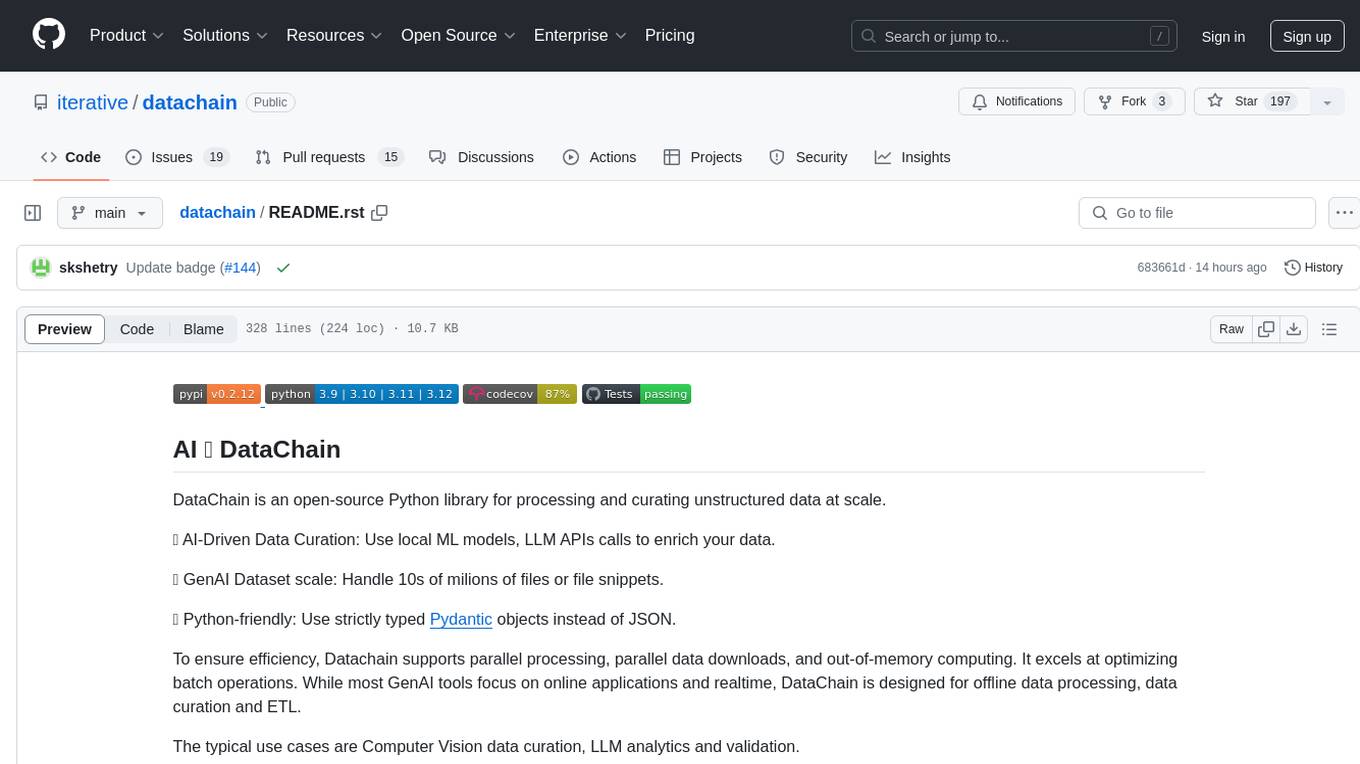
DataChain is an open-source Python library for processing and curating unstructured data at scale. It supports AI-driven data curation using local ML models and LLM APIs, handles large datasets, and is Python-friendly with Pydantic objects. It excels at optimizing batch operations and is designed for offline data processing, curation, and ETL. Typical use cases include Computer Vision data curation, LLM analytics, and validation.
README:
|PyPI| |Python Version| |Codecov| |Tests| |DeepWiki|
.. |logo| image:: docs/assets/datachain.svg :height: 24 .. |PyPI| image:: https://img.shields.io/pypi/v/datachain.svg :target: https://pypi.org/project/datachain/ :alt: PyPI .. |Python Version| image:: https://img.shields.io/pypi/pyversions/datachain :target: https://pypi.org/project/datachain :alt: Python Version .. |Codecov| image:: https://codecov.io/gh/iterative/datachain/graph/badge.svg?token=byliXGGyGB :target: https://codecov.io/gh/iterative/datachain :alt: Codecov .. |Tests| image:: https://github.com/iterative/datachain/actions/workflows/tests.yml/badge.svg :target: https://github.com/iterative/datachain/actions/workflows/tests.yml :alt: Tests .. |DeepWiki| image:: https://deepwiki.com/badge.svg :target: https://deepwiki.com/iterative/datachain :alt: DeepWiki
DataChain is a Python-based AI-data warehouse for transforming and analyzing unstructured data like images, audio, videos, text and PDFs. It integrates with external storage (e.g. S3) to process data efficiently without data duplication and manages metadata in an internal database for easy and efficient querying.
-
ETL. Pythonic framework for describing and running unstructured data transformations and enrichments, applying models to data, including LLMs.
-
Analytics. DataChain dataset is a table that combines all the information about data objects in one place + it provides dataframe-like API and vectorized engine to do analytics on these tables at scale.
-
Versioning. DataChain doesn't store, require moving or copying data (unlike DVC). Perfect use case is a bucket with thousands or millions of images, videos, audio, PDFs.
-
Incremental Processing. DataChain's delta and retry features allow for efficient processing workflows:
- Delta Processing: Process only new or changed files/records
- Retry Processing: Automatically reprocess records with errors or missing results
- Combined Approach: Process new data and fix errors in a single pipeline
Visit Quick Start <https://docs.datachain.ai/quick-start>_ and Docs <https://docs.datachain.ai/>_
to get started with DataChain and learn more.
.. code:: bash
pip install datachain
Sometimes users only need to download a specific subset of files from cloud storage, rather than the entire dataset. For example, you could use a JSON file's metadata to download just cat images with high confidence scores.
.. code:: py
import datachain as dc
meta = dc.read_json("gs://datachain-demo/dogs-and-cats/*json", column="meta", anon=True)
images = dc.read_storage("gs://datachain-demo/dogs-and-cats/*jpg", anon=True)
images_id = images.map(id=lambda file: file.path.split('.')[-2])
annotated = images_id.merge(meta, on="id", right_on="meta.id")
likely_cats = annotated.filter((dc.Column("meta.inference.confidence") > 0.93) \
& (dc.Column("meta.inference.class_") == "cat"))
likely_cats.to_storage("high-confidence-cats/", signal="file")
This example shows how to use both delta and retry processing for efficient handling of large datasets that evolve over time and may occasionally have processing errors.
.. code:: py
import datachain as dc
def process_file(file: dc.File) -> tuple[str, str, str]:
"""Analyze a file, may occasionally fail."""
try:
# Your processing logic here
content = file.read_text()
result = content.upper()
return content, result, "" # No error
except Exception as e:
# Return an error that will trigger reprocessing next time
return "", "", str(e) # Error field will trigger retry
# Process files efficiently with delta and retry
# Run it many times, keep adding files, to see delta and retry in action
chain = (
dc.read_storage(
"data/",
update=True,
delta=True, # Process only new/changed files
delta_on="file.path", # Identify files by path
delta_retry="error", # Process files with error again
)
.map(process_file, output=("content", "result", "error"))
.save("processed-data")
)
In this example, we evaluate chatbot conversations stored in text files using LLM based evaluation.
.. code:: shell
$ pip install mistralai # Requires version >=1.0.0
$ export MISTRAL_API_KEY=_your_key_
Python code:
.. code:: py
import os
from mistralai import Mistral
import datachain as dc
PROMPT = "Was this dialog successful? Answer in a single word: Success or Failure."
def eval_dialogue(file: dc.File) -> bool:
client = Mistral(api_key = os.environ["MISTRAL_API_KEY"])
response = client.chat.complete(
model="open-mixtral-8x22b",
messages=[{"role": "system", "content": PROMPT},
{"role": "user", "content": file.read()}])
result = response.choices[0].message.content
return result.lower().startswith("success")
chain = (
dc.read_storage("gs://datachain-demo/chatbot-KiT/", column="file", anon=True)
.settings(parallel=4, cache=True)
.map(is_success=eval_dialogue)
.save("mistral_files")
)
successful_chain = chain.filter(dc.Column("is_success") == True)
successful_chain.to_storage("./output_mistral")
print(f"{successful_chain.count()} files were exported")
With the instruction above, the Mistral model considers 31/50 files to hold the successful dialogues:
.. code:: shell
$ ls output_mistral/datachain-demo/chatbot-KiT/
1.txt 15.txt 18.txt 2.txt 22.txt 25.txt 28.txt 33.txt 37.txt 4.txt 41.txt ...
$ ls output_mistral/datachain-demo/chatbot-KiT/ | wc -l
31
📂 Multimodal Dataset Versioning.
- Version unstructured data without moving or creating data copies, by supporting references to S3, GCP, Azure, and local file systems.
- Multimodal data support: images, video, text, PDFs, JSONs, CSVs, parquet, etc.
- Unite files and metadata together into persistent, versioned, columnar datasets.
🐍 Python-friendly.
- Operate on Python objects and object fields: float scores, strings, matrixes, LLM response objects.
- Run Python code in a high-scale, terabytes size datasets, with built-in parallelization and memory-efficient computing — no SQL or Spark required.
🧠 Data Enrichment and Processing.
- Generate metadata using local AI models and LLM APIs.
- Filter, join, and group datasets by metadata. Search by vector embeddings.
- High-performance vectorized operations on Python objects: sum, count, avg, etc.
- Pass datasets to Pytorch and Tensorflow, or export them back into storage.
Contributions are very welcome. To learn more, see the Contributor Guide_.
-
Docs <https://docs.datachain.ai/>_ -
File an issue_ if you encounter any problems -
Discord Chat <https://dvc.org/chat>_ -
Email <mailto:[email protected]>_ -
Twitter <https://twitter.com/DVCorg>_
DataChain Studio_ is a proprietary solution for teams that offers:
- Centralized dataset registry to manage data, code and dependencies in one place.
- Data Lineage for data sources as well as derivative dataset.
- UI for Multimodal Data like images, videos, and PDFs.
- Scalable Compute to handle large datasets (100M+ files) and in-house AI model inference.
- Access control including SSO and team based collaboration.
.. _PyPI: https://pypi.org/ .. _file an issue: https://github.com/iterative/datachain/issues .. github-only .. _Contributor Guide: https://docs.datachain.ai/contributing .. _Pydantic: https://github.com/pydantic/pydantic .. _publicly available: https://radar.kit.edu/radar/en/dataset/FdJmclKpjHzLfExE.ExpBot%2B-%2BA%2Bdataset%2Bof%2B79%2Bdialogs%2Bwith%2Ban%2Bexperimental%2Bcustomer%2Bservice%2Bchatbot .. _SQLite: https://www.sqlite.org/ .. _Getting Started: https://docs.datachain.ai/ .. _DataChain Studio: https://studio.datachain.ai/
For Tasks:
Click tags to check more tools for each tasksFor Jobs:
Alternative AI tools for datachain
Similar Open Source Tools

datachain
DataChain is an open-source Python library for processing and curating unstructured data at scale. It supports AI-driven data curation using local ML models and LLM APIs, handles large datasets, and is Python-friendly with Pydantic objects. It excels at optimizing batch operations and is designed for offline data processing, curation, and ETL. Typical use cases include Computer Vision data curation, LLM analytics, and validation.
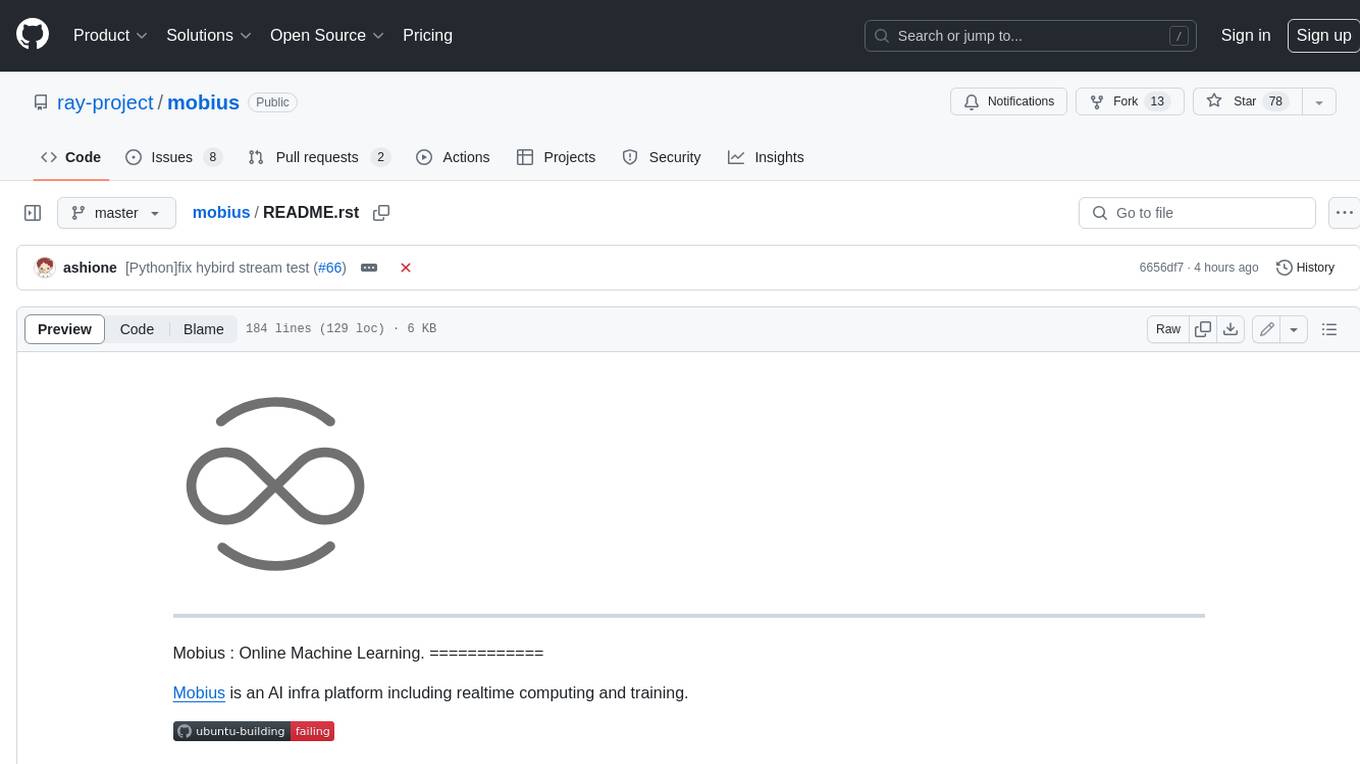
mobius
Mobius is an AI infra platform including realtime computing and training. It is built on Ray, a distributed computing framework, and provides a number of features that make it well-suited for online machine learning tasks. These features include: * **Cross Language**: Mobius can run in multiple languages (only Python and Java are supported currently) with high efficiency. You can implement your operator in different languages and run them in one job. * **Single Node Failover**: Mobius has a special failover mechanism that only needs to rollback the failed node itself, in most cases, to recover the job. This is a huge benefit if your job is sensitive about failure recovery time. * **AutoScaling**: Mobius can generate a new graph with different configurations in runtime without stopping the job. * **Fusion Training**: Mobius can combine TensorFlow/Pytorch and streaming, then building an e2e online machine learning pipeline. Mobius is still under development, but it has already been used to power a number of real-world applications, including: * A real-time recommendation system for a major e-commerce company * A fraud detection system for a large financial institution * A personalized news feed for a major news organization If you are interested in using Mobius for your own online machine learning projects, you can find more information in the documentation.

semantic-kernel
Semantic Kernel is an SDK that integrates Large Language Models (LLMs) like OpenAI, Azure OpenAI, and Hugging Face with conventional programming languages like C#, Python, and Java. Semantic Kernel achieves this by allowing you to define plugins that can be chained together in just a few lines of code. What makes Semantic Kernel _special_ , however, is its ability to _automatically_ orchestrate plugins with AI. With Semantic Kernel planners, you can ask an LLM to generate a plan that achieves a user's unique goal. Afterwards, Semantic Kernel will execute the plan for the user.
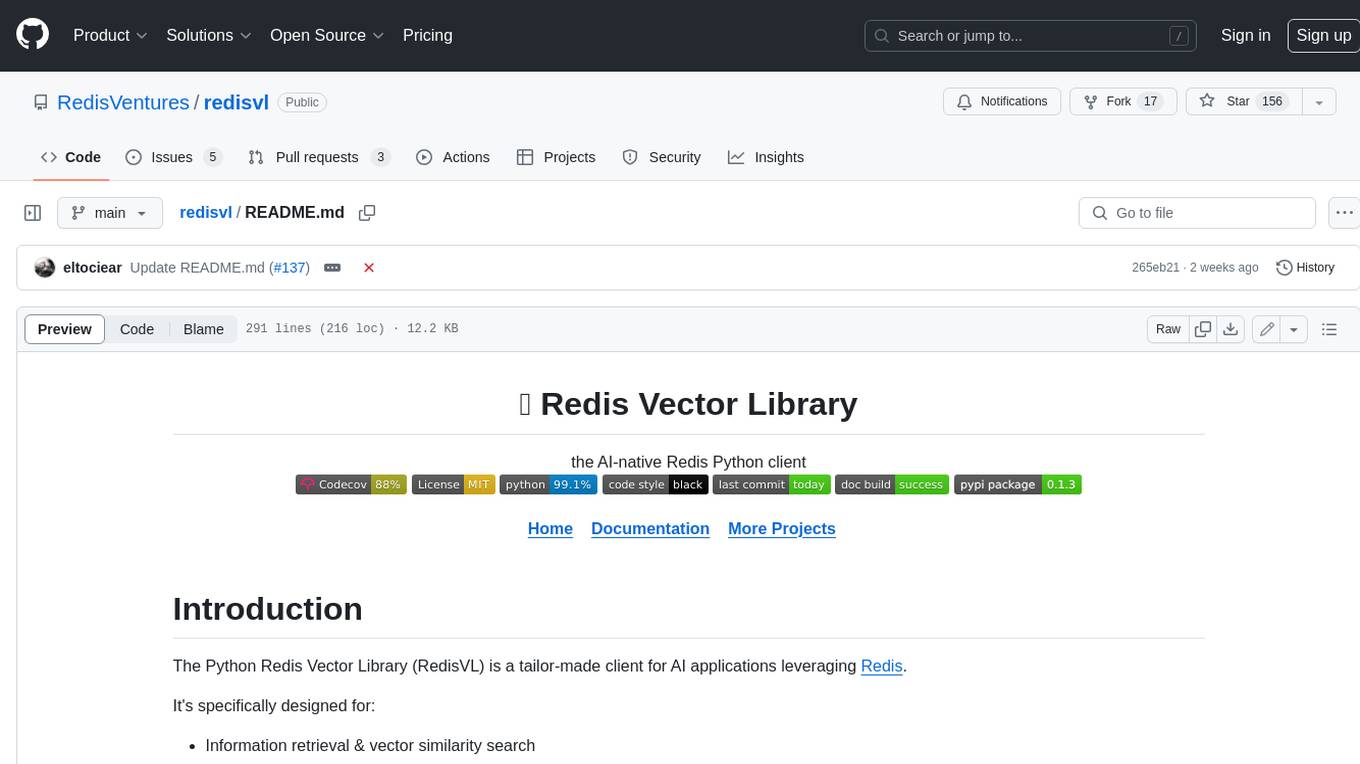
redisvl
Redis Vector Library (RedisVL) is a Python client library for building AI applications on top of Redis. It provides a high-level interface for managing vector indexes, performing vector search, and integrating with popular embedding models and providers. RedisVL is designed to make it easy for developers to build and deploy AI applications that leverage the speed, flexibility, and reliability of Redis.
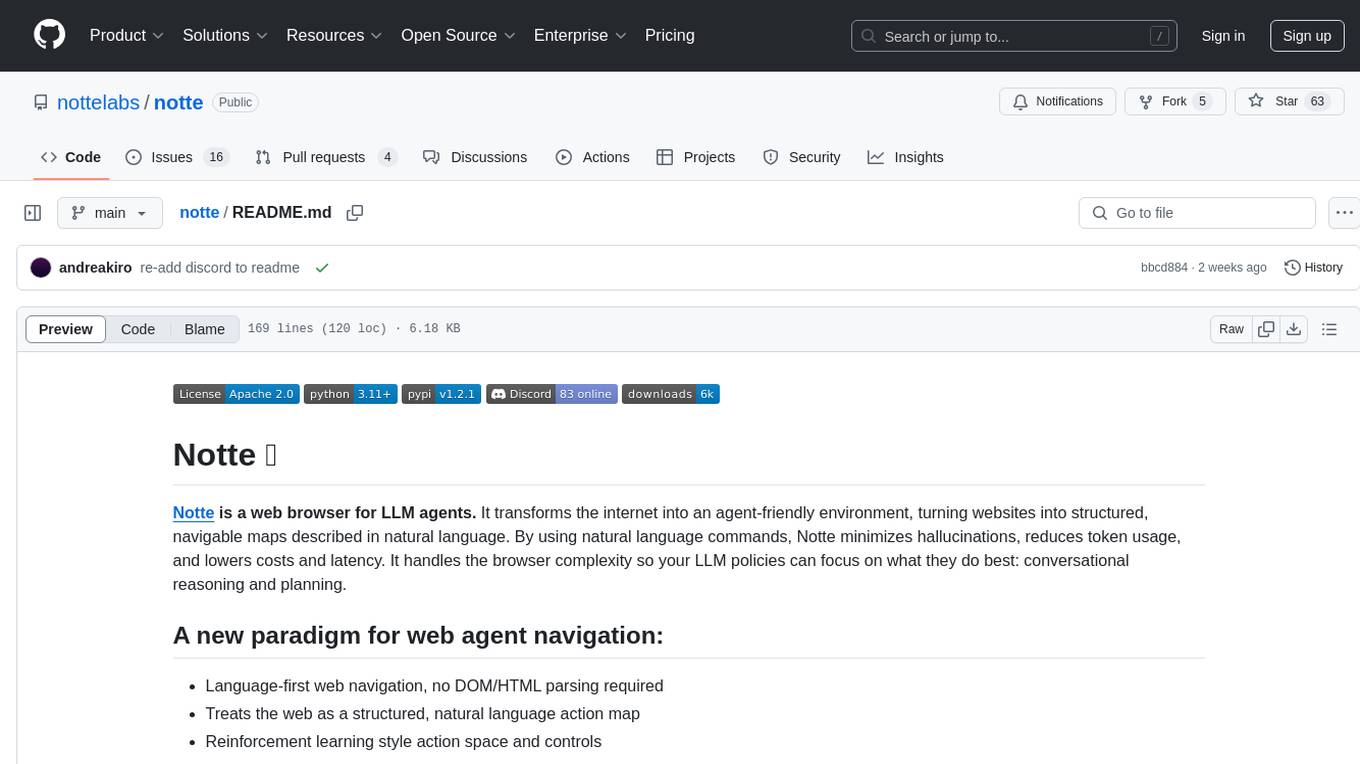
notte
Notte is a web browser designed specifically for LLM agents, providing a language-first web navigation experience without the need for DOM/HTML parsing. It transforms websites into structured, navigable maps described in natural language, enabling users to interact with the web using natural language commands. By simplifying browser complexity, Notte allows LLM policies to focus on conversational reasoning and planning, reducing token usage, costs, and latency. The tool supports various language model providers and offers a reinforcement learning style action space and controls for full navigation control.
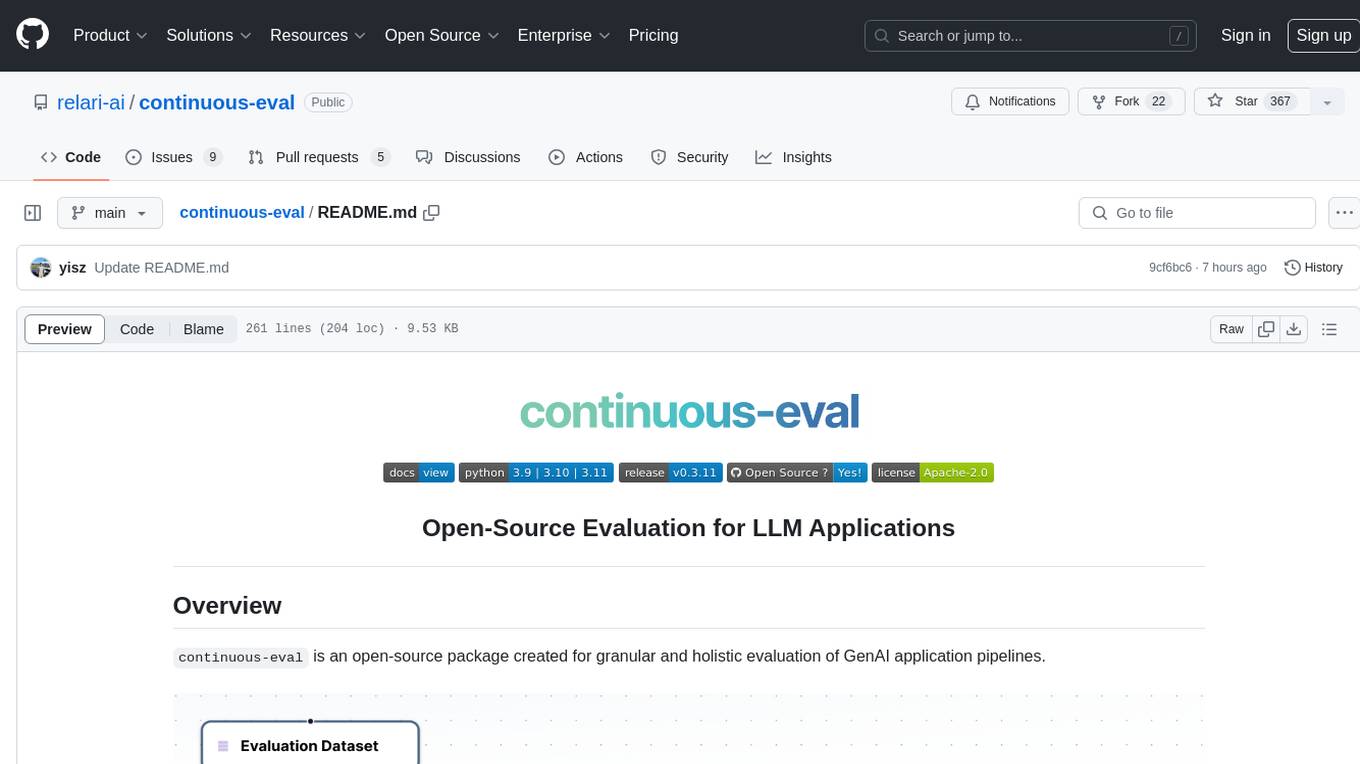
continuous-eval
Open-Source Evaluation for LLM Applications. `continuous-eval` is an open-source package created for granular and holistic evaluation of GenAI application pipelines. It offers modularized evaluation, a comprehensive metric library covering various LLM use cases, the ability to leverage user feedback in evaluation, and synthetic dataset generation for testing pipelines. Users can define their own metrics by extending the Metric class. The tool allows running evaluation on a pipeline defined with modules and corresponding metrics. Additionally, it provides synthetic data generation capabilities to create user interaction data for evaluation or training purposes.
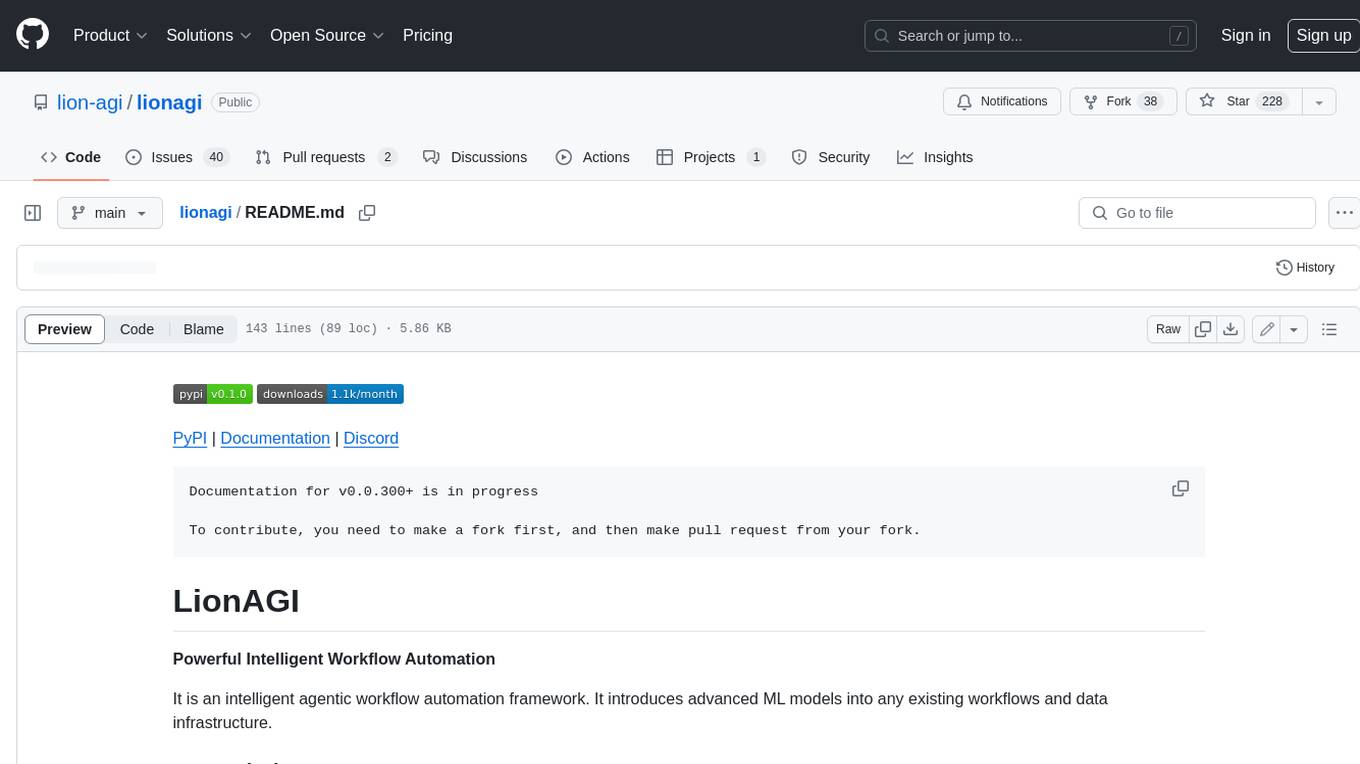
lionagi
LionAGI is a powerful intelligent workflow automation framework that introduces advanced ML models into any existing workflows and data infrastructure. It can interact with almost any model, run interactions in parallel for most models, produce structured pydantic outputs with flexible usage, automate workflow via graph based agents, use advanced prompting techniques, and more. LionAGI aims to provide a centralized agent-managed framework for "ML-powered tools coordination" and to dramatically lower the barrier of entries for creating use-case/domain specific tools. It is designed to be asynchronous only and requires Python 3.10 or higher.
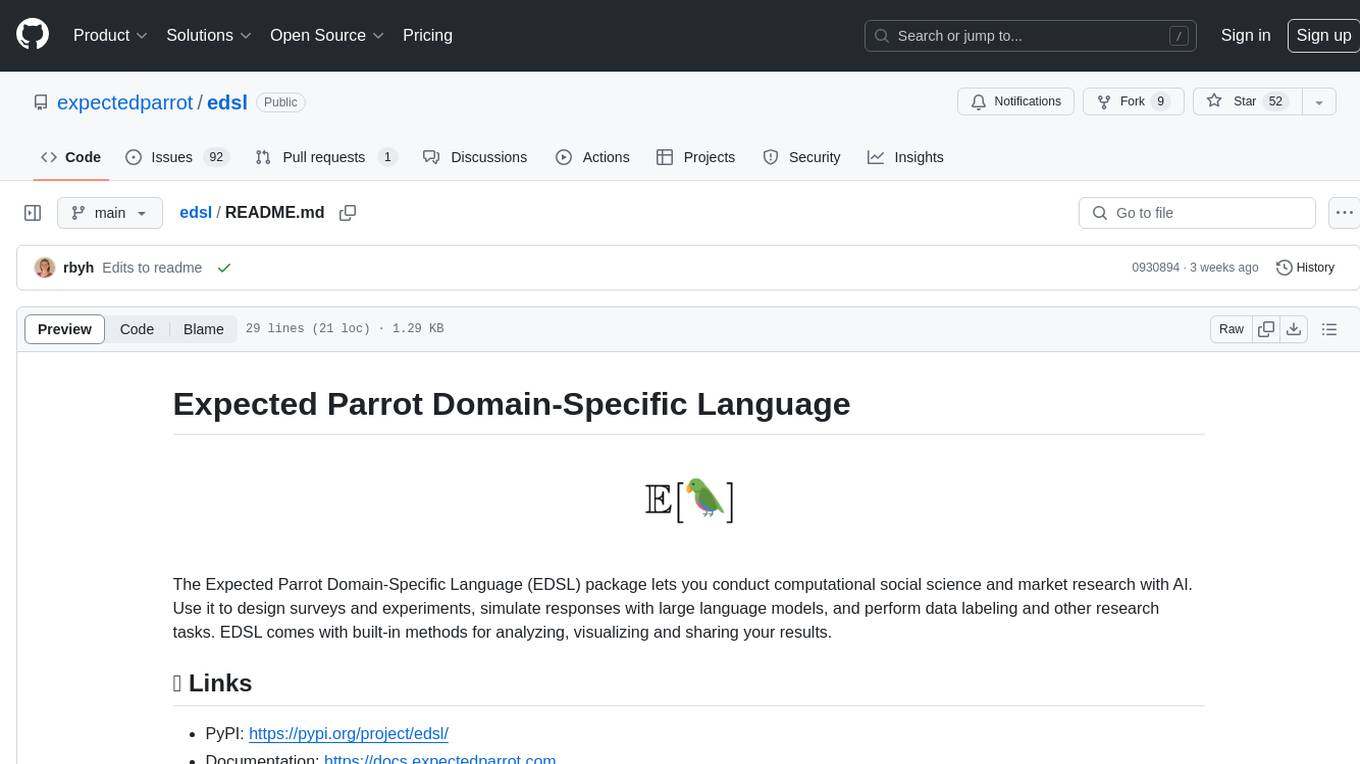
edsl
The Expected Parrot Domain-Specific Language (EDSL) package enables users to conduct computational social science and market research with AI. It facilitates designing surveys and experiments, simulating responses using large language models, and performing data labeling and other research tasks. EDSL includes built-in methods for analyzing, visualizing, and sharing research results. It is compatible with Python 3.9 - 3.11 and requires API keys for LLMs stored in a `.env` file.
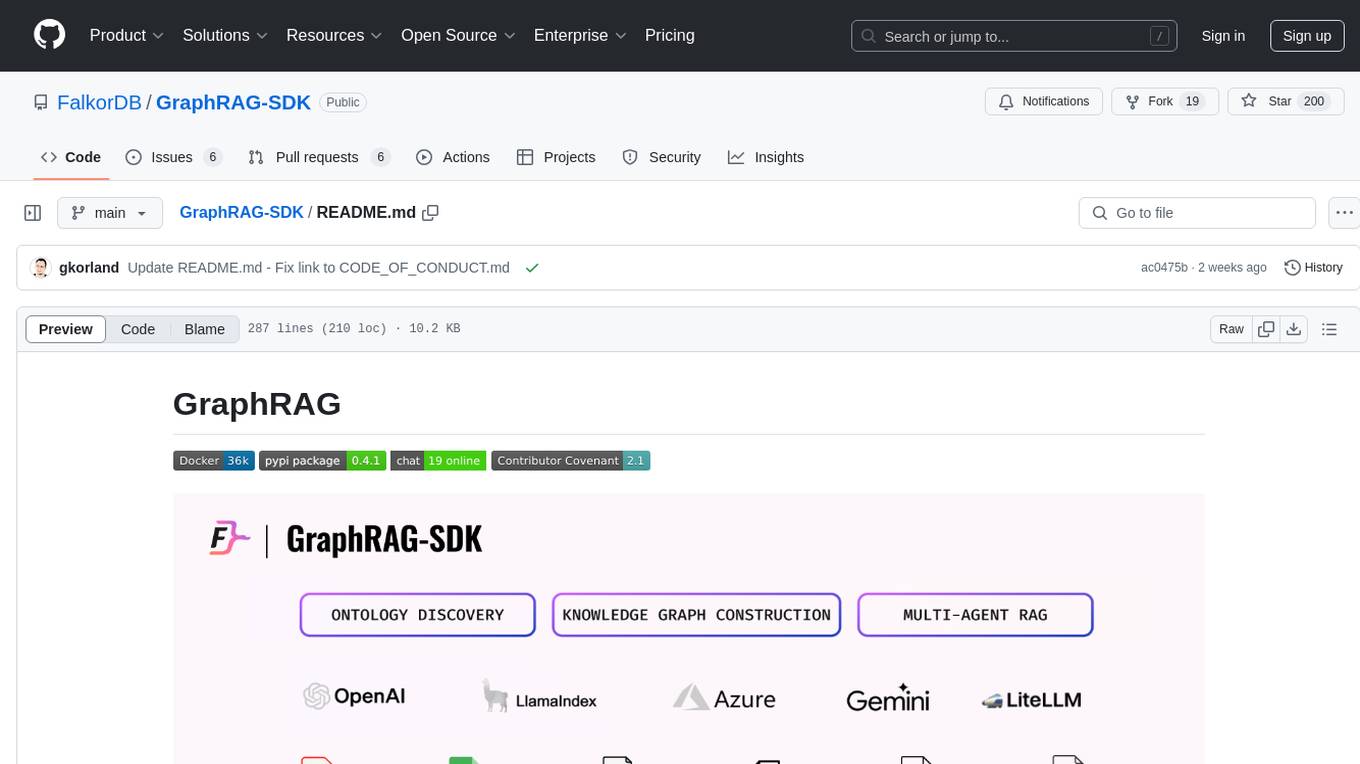
GraphRAG-SDK
Build fast and accurate GenAI applications with GraphRAG SDK, a specialized toolkit for building Graph Retrieval-Augmented Generation (GraphRAG) systems. It integrates knowledge graphs, ontology management, and state-of-the-art LLMs to deliver accurate, efficient, and customizable RAG workflows. The SDK simplifies the development process by automating ontology creation, knowledge graph agent creation, and query handling, enabling users to interact and query their knowledge graphs effectively. It supports multi-agent systems and orchestrates agents specialized in different domains. The SDK is optimized for FalkorDB, ensuring high performance and scalability for large-scale applications. By leveraging knowledge graphs, it enables semantic relationships and ontology-driven queries that go beyond standard vector similarity, enhancing retrieval-augmented generation capabilities.
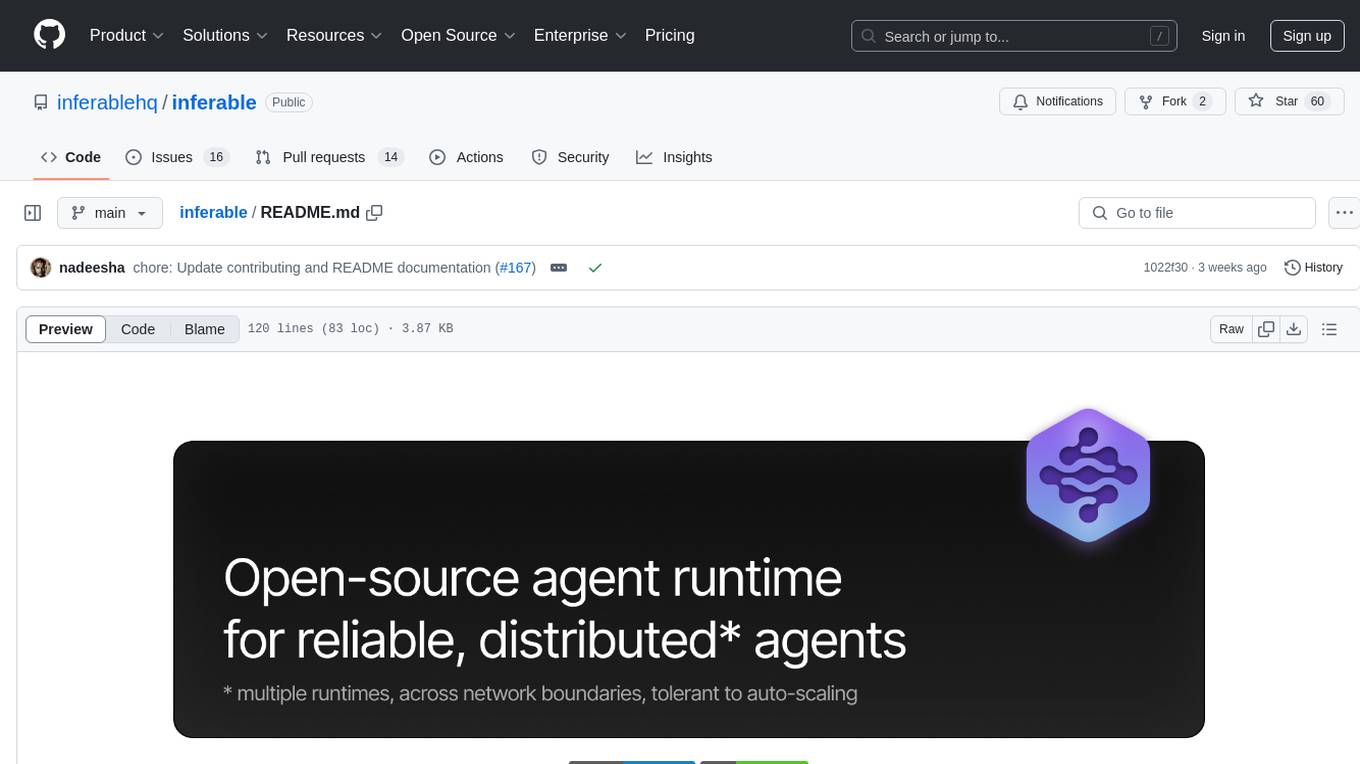
inferable
Inferable is an open source platform that helps users build reliable LLM-powered agentic automations at scale. It offers a managed agent runtime, durable tool calling, zero network configuration, multiple language support, and is fully open source under the MIT license. Users can define functions, register them with Inferable, and create runs that utilize these functions to automate tasks. The platform supports Node.js/TypeScript, Go, .NET, and React, and provides SDKs, core services, and bootstrap templates for various languages.
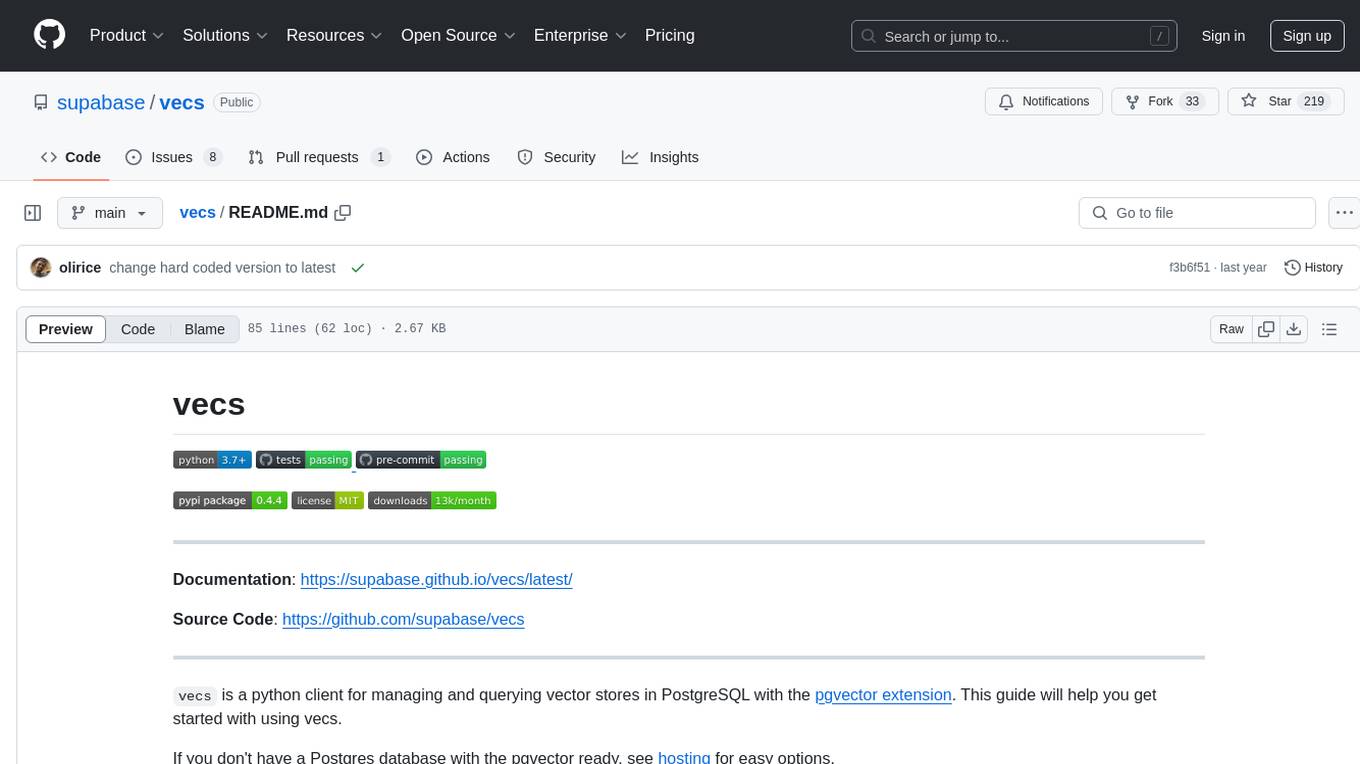
vecs
vecs is a Python client for managing and querying vector stores in PostgreSQL with the pgvector extension. It allows users to create collections of vectors with associated metadata, index the collections for fast search performance, and query the collections based on specified filters. The tool simplifies the process of working with vector data in a PostgreSQL database, making it easier to store, retrieve, and analyze vector information.
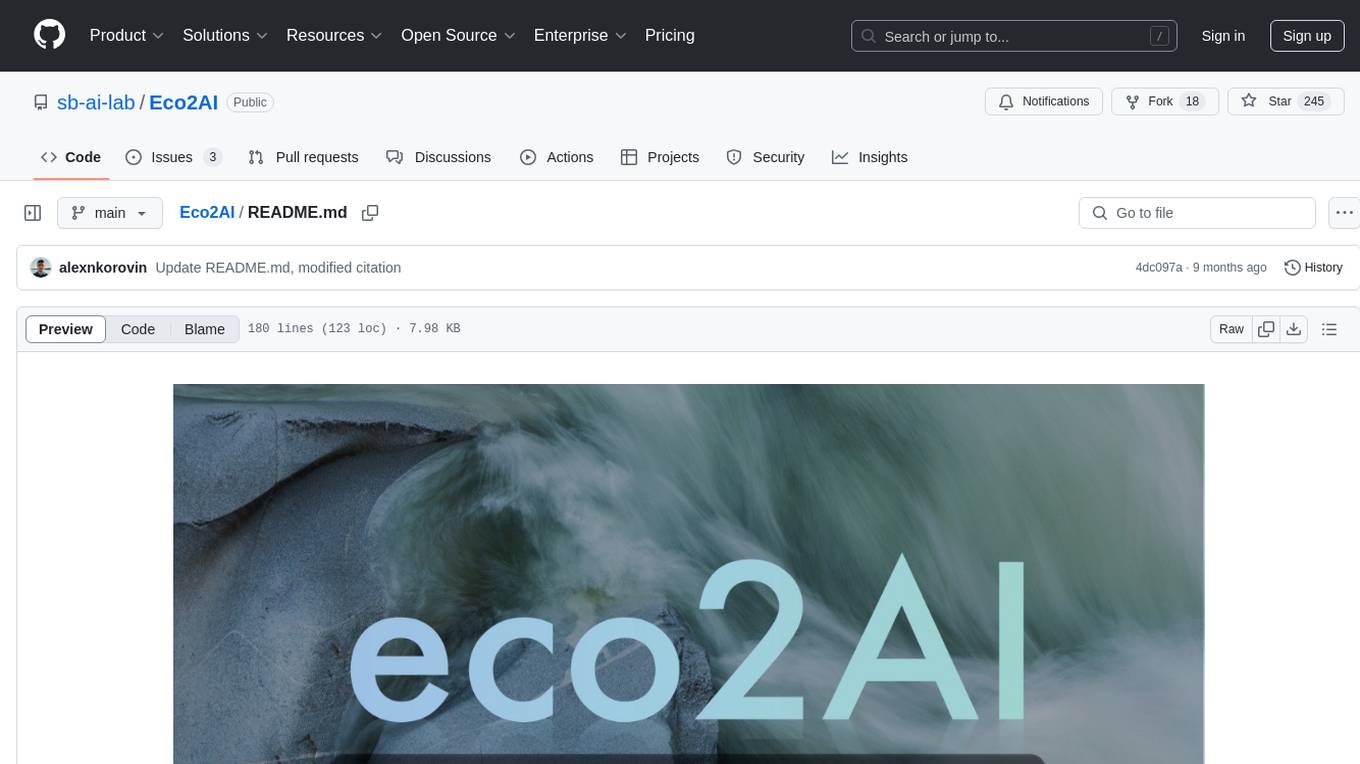
Eco2AI
Eco2AI is a python library for CO2 emission tracking that monitors energy consumption of CPU & GPU devices and estimates equivalent carbon emissions based on regional emission coefficients. Users can easily integrate Eco2AI into their Python scripts by adding a few lines of code. The library records emissions data and device information in a local file, providing detailed session logs with project names, experiment descriptions, start times, durations, power consumption, CO2 emissions, CPU and GPU names, operating systems, and countries.

rl
TorchRL is an open-source Reinforcement Learning (RL) library for PyTorch. It provides pytorch and **python-first** , low and high level abstractions for RL that are intended to be **efficient** , **modular** , **documented** and properly **tested**. The code is aimed at supporting research in RL. Most of it is written in python in a highly modular way, such that researchers can easily swap components, transform them or write new ones with little effort.
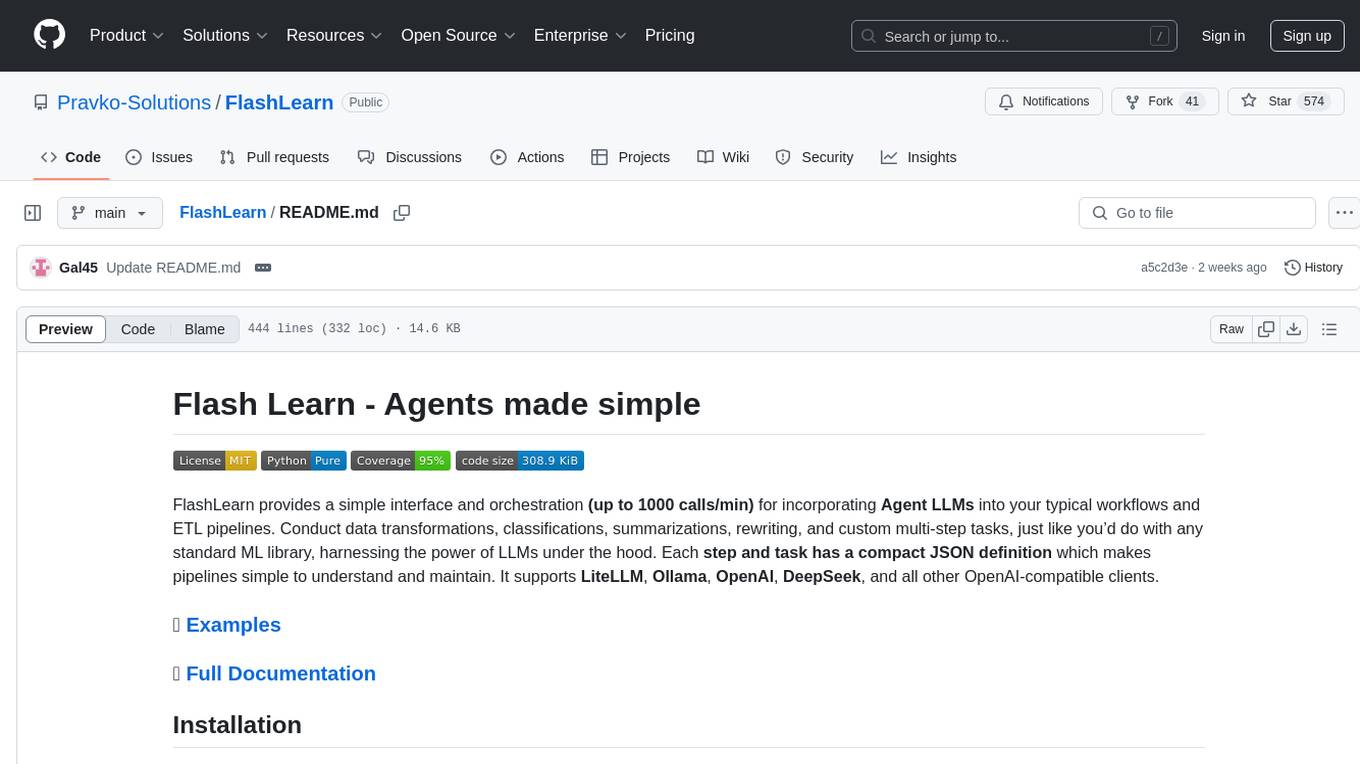
FlashLearn
FlashLearn is a tool that provides a simple interface and orchestration for incorporating Agent LLMs into workflows and ETL pipelines. It allows data transformations, classifications, summarizations, rewriting, and custom multi-step tasks using LLMs. Each step and task has a compact JSON definition, making pipelines easy to understand and maintain. FlashLearn supports LiteLLM, Ollama, OpenAI, DeepSeek, and other OpenAI-compatible clients.
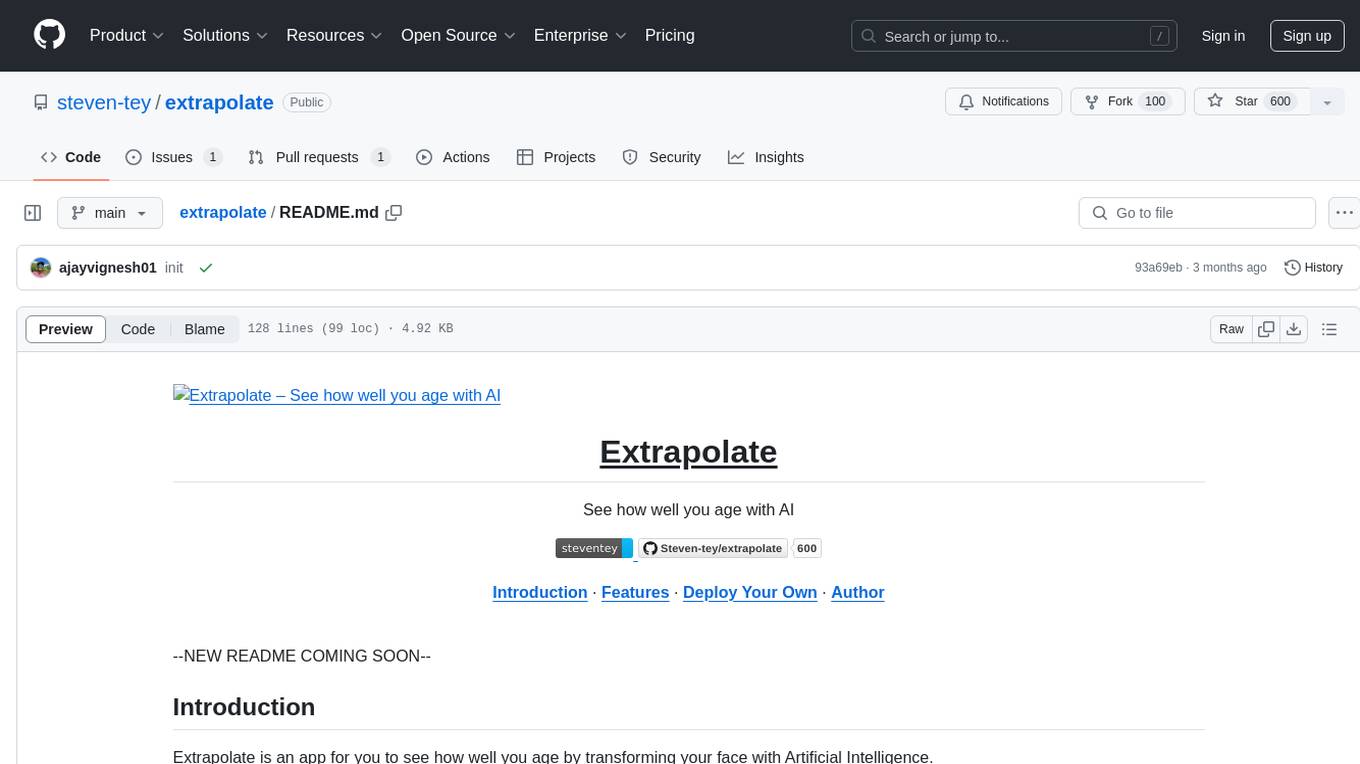
extrapolate
Extrapolate is an app that uses Artificial Intelligence to show you how your face ages over time. It generates a 3-second GIF of your aging face and allows you to store and retrieve photos from Cloudflare R2 using Workers. Users can deploy their own version of Extrapolate on Vercel by setting up ReplicateHQ and Upstash accounts, as well as creating a Cloudflare R2 instance with a Cloudflare Worker to handle uploads and reads. The tool provides a fun and interactive way to visualize the aging process through AI technology.
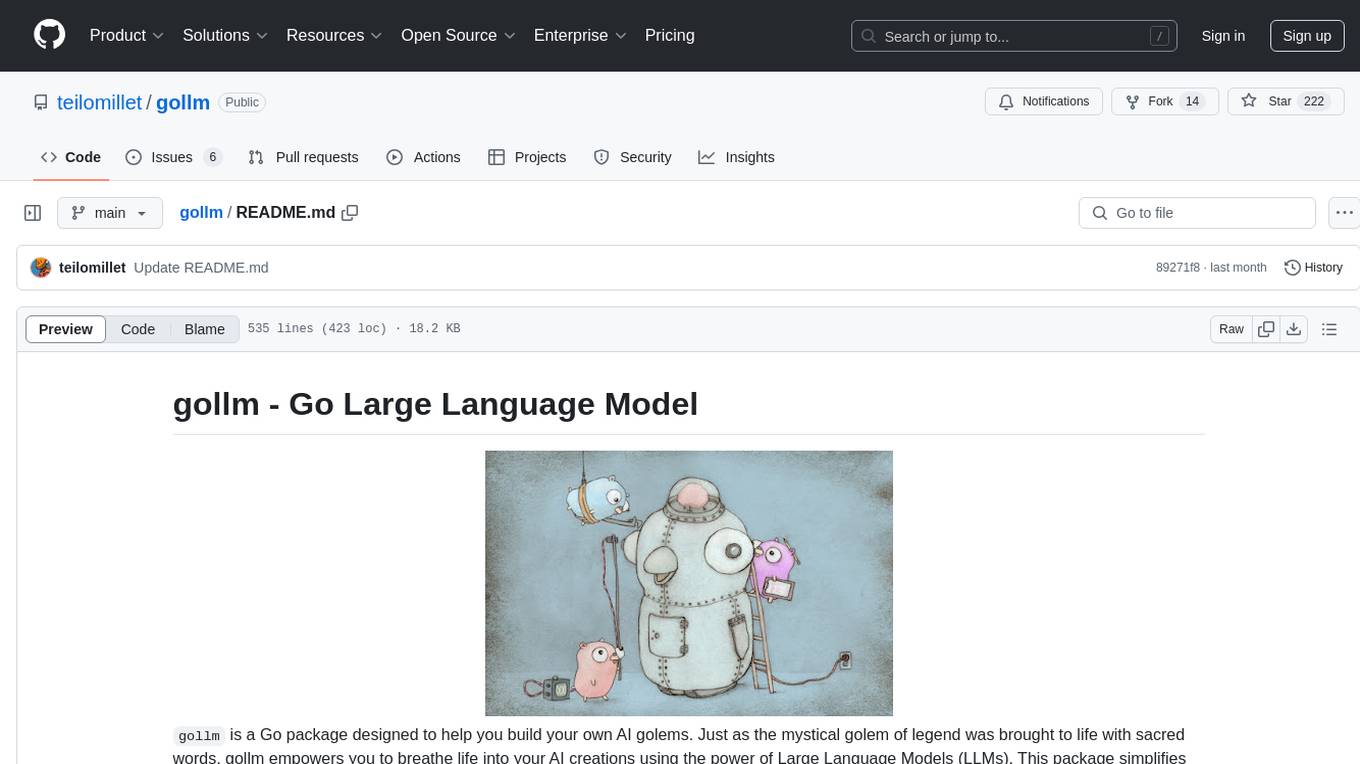
gollm
gollm is a Go package designed to simplify interactions with Large Language Models (LLMs) for AI engineers and developers. It offers a unified API for multiple LLM providers, easy provider and model switching, flexible configuration options, advanced prompt engineering, prompt optimization, memory retention, structured output and validation, provider comparison tools, high-level AI functions, robust error handling and retries, and extensible architecture. The package enables users to create AI-powered golems for tasks like content creation workflows, complex reasoning tasks, structured data generation, model performance analysis, prompt optimization, and creating a mixture of agents.
For similar tasks

datachain
DataChain is an open-source Python library for processing and curating unstructured data at scale. It supports AI-driven data curation using local ML models and LLM APIs, handles large datasets, and is Python-friendly with Pydantic objects. It excels at optimizing batch operations and is designed for offline data processing, curation, and ETL. Typical use cases include Computer Vision data curation, LLM analytics, and validation.
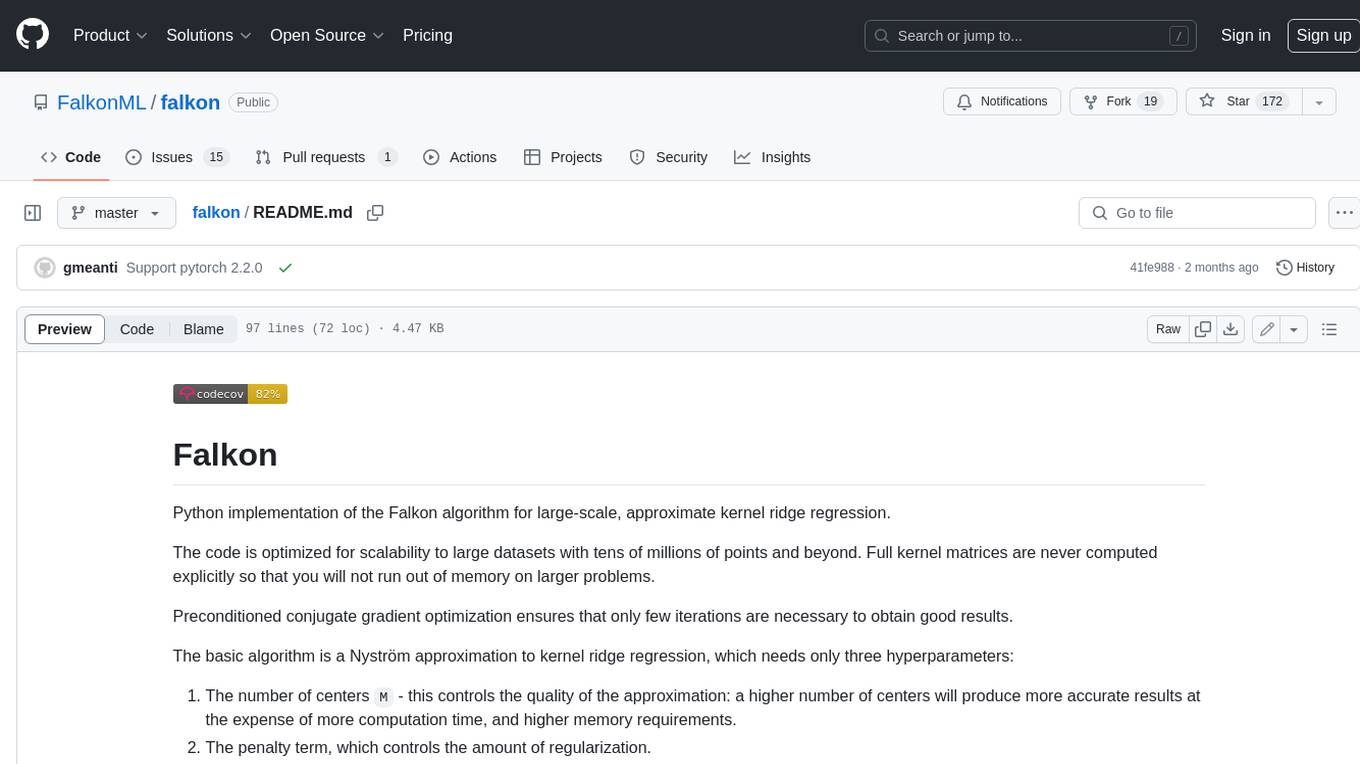
falkon
Falkon is a Python implementation of the Falkon algorithm for large-scale, approximate kernel ridge regression. The code is optimized for scalability to large datasets with tens of millions of points and beyond. Full kernel matrices are never computed explicitly so that you will not run out of memory on larger problems. Preconditioned conjugate gradient optimization ensures that only few iterations are necessary to obtain good results. The basic algorithm is a Nyström approximation to kernel ridge regression, which needs only three hyperparameters: 1. The number of centers M - this controls the quality of the approximation: a higher number of centers will produce more accurate results at the expense of more computation time, and higher memory requirements. 2. The penalty term, which controls the amount of regularization. 3. The kernel function. A good default is always the Gaussian (RBF) kernel (`falkon.kernels.GaussianKernel`).

ray
Ray is a unified framework for scaling AI and Python applications. It consists of a core distributed runtime and a set of AI libraries for simplifying ML compute, including Data, Train, Tune, RLlib, and Serve. Ray runs on any machine, cluster, cloud provider, and Kubernetes, and features a growing ecosystem of community integrations. With Ray, you can seamlessly scale the same code from a laptop to a cluster, making it easy to meet the compute-intensive demands of modern ML workloads.

aiscript
AiScript is a lightweight scripting language that runs on JavaScript. It supports arrays, objects, and functions as first-class citizens, and is easy to write without the need for semicolons or commas. AiScript runs in a secure sandbox environment, preventing infinite loops from freezing the host. It also allows for easy provision of variables and functions from the host.
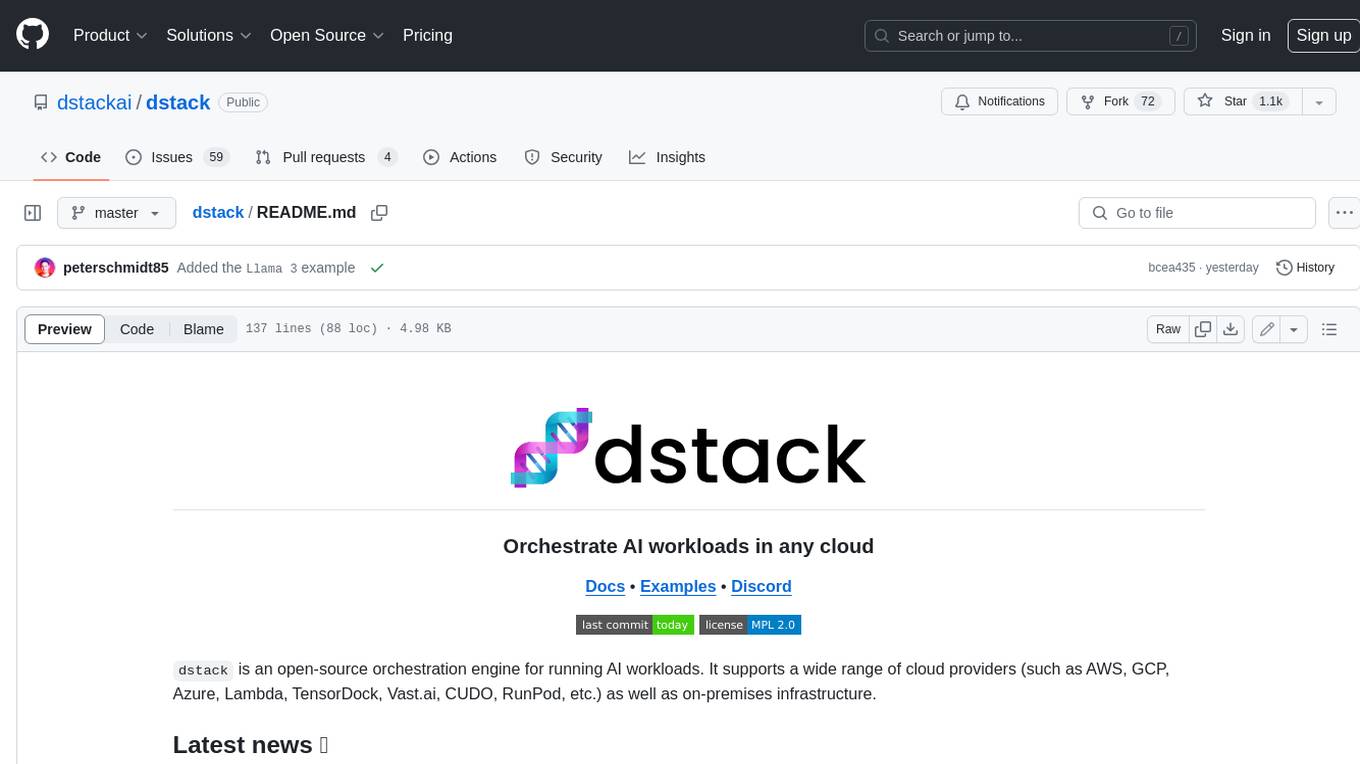
dstack
Dstack is an open-source orchestration engine for running AI workloads in any cloud. It supports a wide range of cloud providers (such as AWS, GCP, Azure, Lambda, TensorDock, Vast.ai, CUDO, RunPod, etc.) as well as on-premises infrastructure. With Dstack, you can easily set up and manage dev environments, tasks, services, and pools for your AI workloads.

mobius
Mobius is an AI infra platform including realtime computing and training. It is built on Ray, a distributed computing framework, and provides a number of features that make it well-suited for online machine learning tasks. These features include: * **Cross Language**: Mobius can run in multiple languages (only Python and Java are supported currently) with high efficiency. You can implement your operator in different languages and run them in one job. * **Single Node Failover**: Mobius has a special failover mechanism that only needs to rollback the failed node itself, in most cases, to recover the job. This is a huge benefit if your job is sensitive about failure recovery time. * **AutoScaling**: Mobius can generate a new graph with different configurations in runtime without stopping the job. * **Fusion Training**: Mobius can combine TensorFlow/Pytorch and streaming, then building an e2e online machine learning pipeline. Mobius is still under development, but it has already been used to power a number of real-world applications, including: * A real-time recommendation system for a major e-commerce company * A fraud detection system for a large financial institution * A personalized news feed for a major news organization If you are interested in using Mobius for your own online machine learning projects, you can find more information in the documentation.
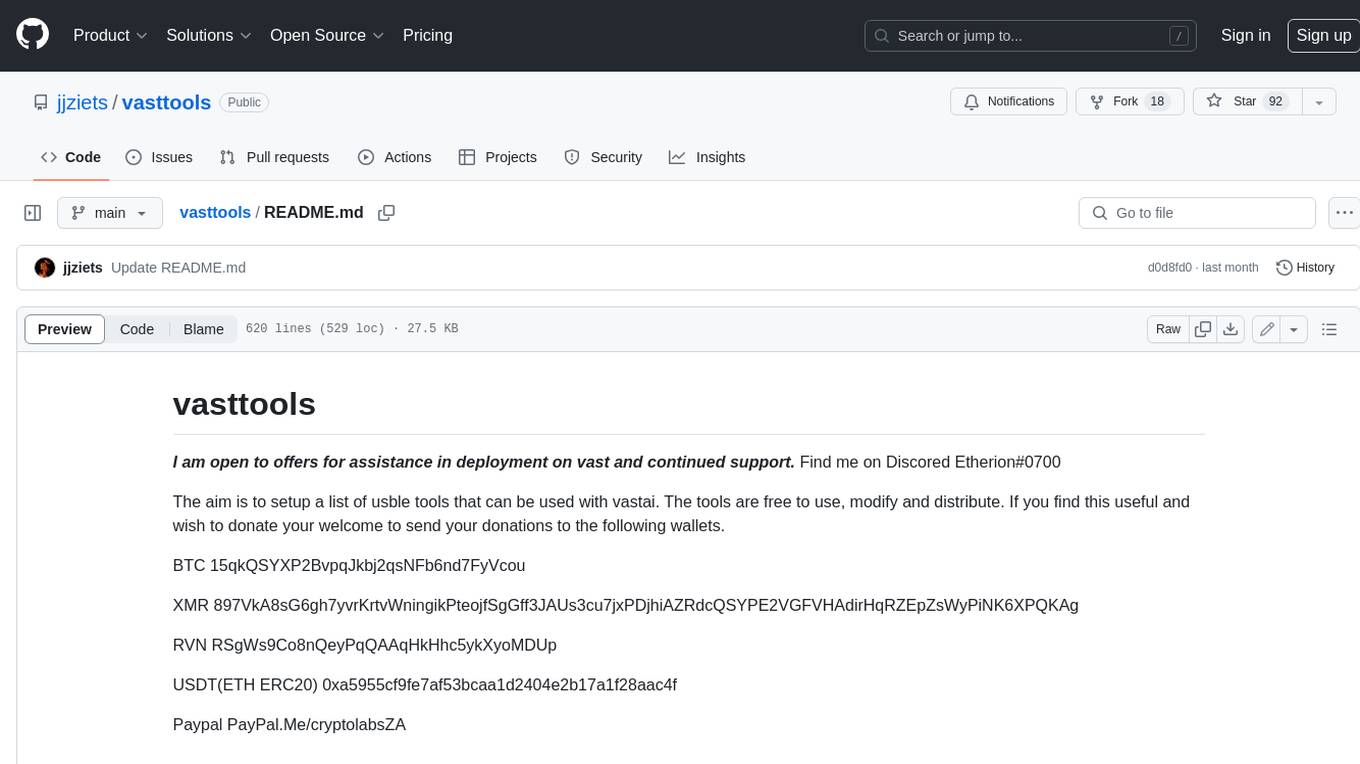
vasttools
This repository contains a collection of tools that can be used with vastai. The tools are free to use, modify and distribute. If you find this useful and wish to donate your welcome to send your donations to the following wallets. BTC 15qkQSYXP2BvpqJkbj2qsNFb6nd7FyVcou XMR 897VkA8sG6gh7yvrKrtvWningikPteojfSgGff3JAUs3cu7jxPDjhiAZRdcQSYPE2VGFVHAdirHqRZEpZsWyPiNK6XPQKAg RVN RSgWs9Co8nQeyPqQAAqHkHhc5ykXyoMDUp USDT(ETH ERC20) 0xa5955cf9fe7af53bcaa1d2404e2b17a1f28aac4f Paypal PayPal.Me/cryptolabsZA
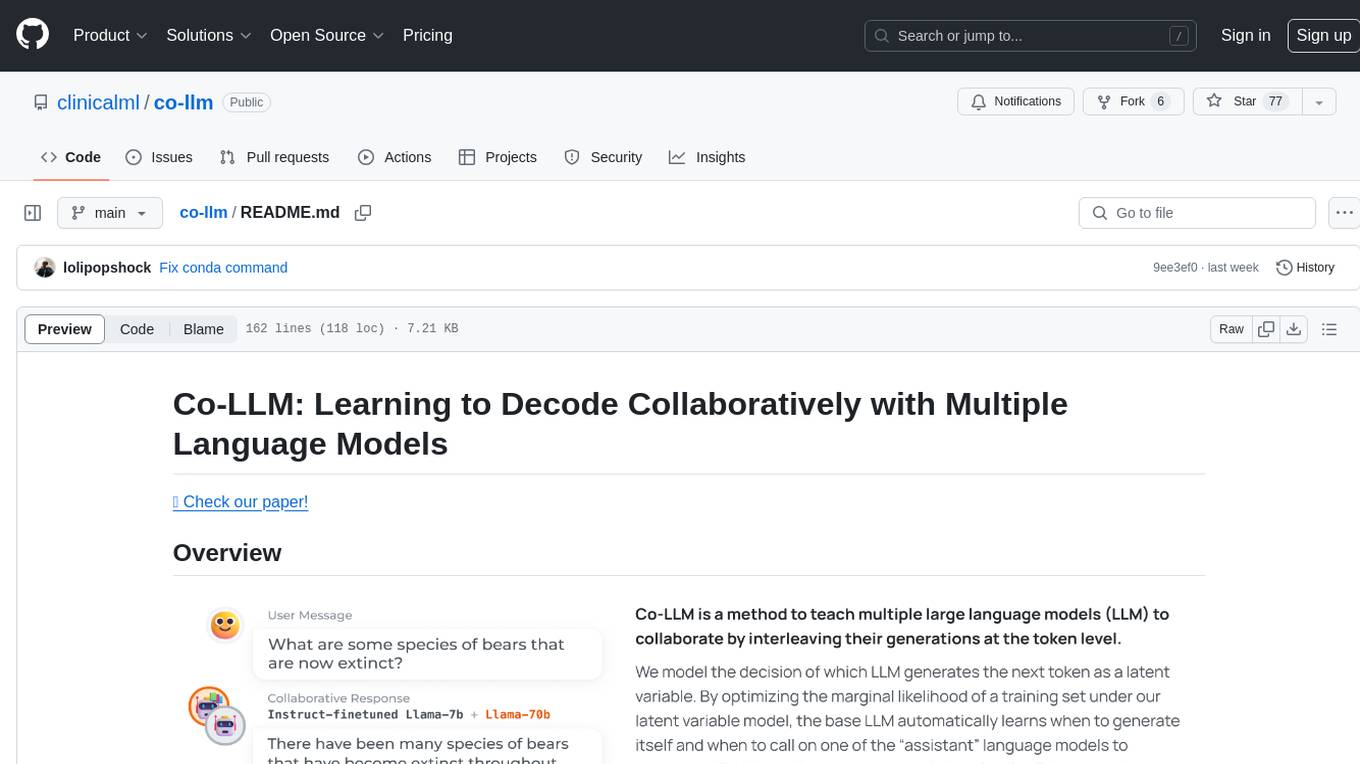
co-llm
Co-LLM (Collaborative Language Models) is a tool for learning to decode collaboratively with multiple language models. It provides a method for data processing, training, and inference using a collaborative approach. The tool involves steps such as formatting/tokenization, scoring logits, initializing Z vector, deferral training, and generating results using multiple models. Co-LLM supports training with different collaboration pairs and provides baseline training scripts for various models. In inference, it uses 'vllm' services to orchestrate models and generate results through API-like services. The tool is inspired by allenai/open-instruct and aims to improve decoding performance through collaborative learning.
For similar jobs

weave
Weave is a toolkit for developing Generative AI applications, built by Weights & Biases. With Weave, you can log and debug language model inputs, outputs, and traces; build rigorous, apples-to-apples evaluations for language model use cases; and organize all the information generated across the LLM workflow, from experimentation to evaluations to production. Weave aims to bring rigor, best-practices, and composability to the inherently experimental process of developing Generative AI software, without introducing cognitive overhead.

LLMStack
LLMStack is a no-code platform for building generative AI agents, workflows, and chatbots. It allows users to connect their own data, internal tools, and GPT-powered models without any coding experience. LLMStack can be deployed to the cloud or on-premise and can be accessed via HTTP API or triggered from Slack or Discord.

VisionCraft
The VisionCraft API is a free API for using over 100 different AI models. From images to sound.

kaito
Kaito is an operator that automates the AI/ML inference model deployment in a Kubernetes cluster. It manages large model files using container images, avoids tuning deployment parameters to fit GPU hardware by providing preset configurations, auto-provisions GPU nodes based on model requirements, and hosts large model images in the public Microsoft Container Registry (MCR) if the license allows. Using Kaito, the workflow of onboarding large AI inference models in Kubernetes is largely simplified.

PyRIT
PyRIT is an open access automation framework designed to empower security professionals and ML engineers to red team foundation models and their applications. It automates AI Red Teaming tasks to allow operators to focus on more complicated and time-consuming tasks and can also identify security harms such as misuse (e.g., malware generation, jailbreaking), and privacy harms (e.g., identity theft). The goal is to allow researchers to have a baseline of how well their model and entire inference pipeline is doing against different harm categories and to be able to compare that baseline to future iterations of their model. This allows them to have empirical data on how well their model is doing today, and detect any degradation of performance based on future improvements.

tabby
Tabby is a self-hosted AI coding assistant, offering an open-source and on-premises alternative to GitHub Copilot. It boasts several key features: * Self-contained, with no need for a DBMS or cloud service. * OpenAPI interface, easy to integrate with existing infrastructure (e.g Cloud IDE). * Supports consumer-grade GPUs.

spear
SPEAR (Simulator for Photorealistic Embodied AI Research) is a powerful tool for training embodied agents. It features 300 unique virtual indoor environments with 2,566 unique rooms and 17,234 unique objects that can be manipulated individually. Each environment is designed by a professional artist and features detailed geometry, photorealistic materials, and a unique floor plan and object layout. SPEAR is implemented as Unreal Engine assets and provides an OpenAI Gym interface for interacting with the environments via Python.

Magick
Magick is a groundbreaking visual AIDE (Artificial Intelligence Development Environment) for no-code data pipelines and multimodal agents. Magick can connect to other services and comes with nodes and templates well-suited for intelligent agents, chatbots, complex reasoning systems and realistic characters.